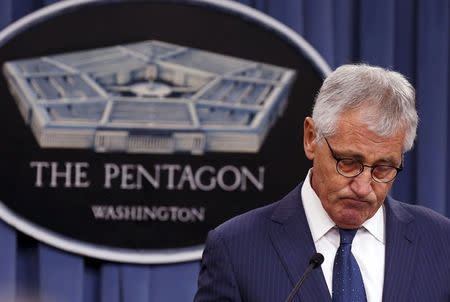Special Report: Defense auditor approved flawed Marine Corps books
By Scot J. Paltrow WASHINGTON (Reuters) - On Feb. 6, 2014, the U.S. Defense Department celebrated a historic victory: The Marine Corps had just become the first branch of the military to pass a financial audit in the two decades since such audits were required by law. The audit covered only a portion of the Corps’ 2012 accounts, but even that was deemed a feat. At a ceremony in the Pentagon’s Hall of Heroes, normally used to bestow medals of honor, then-Secretary of Defense Chuck Hagel told the assembled group: “I know that it might seem a bit unusual to be in the Hall of Heroes to honor a bookkeeping accomplishment, but, damn, this is an accomplishment.” Except that it wasn’t. Little more than a year later, on March 23, 2015, the Defense Department’s Office of the Inspector General, the Pentagon’s independent auditor, withdrew its “unqualified” approval of the Marine Corps’ accounts. In a statement posted on its website, the inspector general’s office said it retracted the opinion because of new information that cast doubt on the reliability of the audit. In fact, Reuters found, the inspector general team overseeing the audit determined months before the clean opinion was issued on Dec. 20, 2013, that the Marine Corps’ books did not pass muster. The Corps’ inability to produce clean books isn’t a surprise. As Reuters reported in its 2013 series “Unaccountable,” the Pentagon has never been audited because of disarray in its bookkeeping – even though Congress ordered the entire government to submit to annual audits two decades ago. But the inside story of the Marine Corps audit process and its aftermath raises new questions about the independence of the inspector general’s office, an agency required by law to serve as an impartial watchdog. That independence will be crucial if the Pentagon is ever audited. GAPS AND INACCURACIES Interviews with people familiar with the audit and a review of internal records show that months before the clean audit opinion was announced, members of the inspector general’s team overseeing the audit found gaps in documentation and inaccuracies in the work of the outside accounting firm hired to do it, Grant Thornton LLP. The team members determined that the Corps had flunked the audit, and they recommended that the inspector general issue a “qualified” opinion. That would be equivalent to a failing grade, signifying that the inspector general couldn’t vouch for the accuracy of the financial statements reviewed. An “unqualified,” or clean, opinion means an auditor certifies that the books adhere to accounting standards and contain no material defects. The team members were continually overruled, interviews and records show, by Daniel Blair, deputy inspector general for auditing. In an Aug. 14, 2013, email, Cecilia Ball, a subordinate of Blair and head of the inspector general’s team overseeing the audit, wrote to other team members: “Dan [Blair] believes that GT [Grant Thornton] has supported an unqualified opinion, we have to do what it takes to reach the same conclusions as GT and he believes USMC [United States Marine Corps] has earned an unqualified opinion.” Ball, Blair and Hagel declined to comment. A Grant Thornton spokeswoman said: “We are confident that our work complied with all professional standards.” The partial audit of the Marine Corps was no mere bureaucratic exercise to impress top Pentagon officials. The Defense Department is the only federal agency that has not complied with the 1992 law that requires annual audits of all government departments. That’s the case even though the Defense Department’s more than $500 billion a year in annual congressional appropriations is by far the largest budget of any government agency. In its 2013 series, Reuters showed that because of outdated accounting systems and bureaucratic resistance, the Pentagon’s books not only can’t pass an audit; they can’t even be audited. The articles detailed the manifold costs of this dysfunction. Chronic pay errors damp troop morale. Incompatible logistics and personnel systems complicate deployments. And the lack of reliable accounts conceals huge sums lost to waste, fraud and mismanagement. "A LEARNING EXPERIENCE" In 2009, an impatient Congress mandated that the entire Defense Department be audit-ready by 2017. The Marine Corps audit shows just how hard that’s going to be. Defense Department Comptroller Mike McCord, who oversees the Defense Department’s finances, said in an interview with Reuters that failure of the Corps audit will probably make it more difficult for the other, bigger military services to take steps needed to receive a clean audit opinion by the deadline. He said the audit was useful as “a learning experience.” As a step toward meeting the deadline, then-Secretary of Defense Leon Panetta in October 2011 ordered the entire Defense Department, including each branch of the military, to prepare an auditable financial statement. These accounts were supposed to cover all outstanding appropriations and how that money had been used. The Pentagon quickly realized that was too much to ask; too many records were missing or inaccurate to show what had been done with money from past years. So it settled for a statement of how money appropriated only for the most recent fiscal year had been used. The Marine Corps was to go first, assembling and providing to the auditors its financial statement for the year ended Sept. 30, 2012. It would try to account for $29.4 billion in “total budgetary resources,” the amount available to the Marine Corps that year. The inspector general’s office used, as it often does, an outside accounting firm to do the basic number-crunching it lacks the staff to do itself. That firm was Grant Thornton, which was already doing work for the Marine Corps under contracts awarded through competitive bidding starting in 2009. Even back then, the selection of Grant Thornton had seemed odd to many in the inspector general’s office, according to Jack Armstrong, an auditor in the office who has since retired. That’s because the inspector general had found serious flaws in a series of smaller, unrelated audits Grant Thornton had done for the agency earlier. For example, a Feb. 10, 2003, quality-control review of Grant Thornton’s audit of defense funds paid to the Arlington, Virginia-based Center for Naval Analyses Corp concluded that the audit “was not adequately planned, executed, and documented.” Inspector General spokeswoman Bridget Serchak said the Grant Thornton office that performed the earlier audits wasn’t the same one that audited the Marine Corps. QUESTIONABLE WORK To oversee Grant Thornton’s work on the Marine Corps job, the inspector general’s office named a team headed by Ball, one of its veteran auditors. Ball’s group, working mostly out of her agency’s offices in Kansas City, Missouri, soon began finding flaws in the auditing of the Corps’ financial statements. According to emails reviewed by Reuters, Grant Thornton had submitted a spreadsheet crucial to determining the audit opinion, but it lacked documentation to back up the numbers in it. The team also found that Grant Thornton approved Marine Corps data without asking for the receipts and other papers to confirm that the information was correct. Despite these growing concerns, Deputy Inspector General Blair in mid-2013 exercised an option to extend Grant Thornton’s contract by a year. Two people with direct knowledge of the audit work said Blair pushed for the extension over objections from inspector general auditors in Ball’s group who argued that Grant Thornton’s work had been deficient. The next month, as Ball’s team pressed for a qualified opinion, Tracy Greene, the Grant Thornton partner overseeing the firm’s Marine Corps job, sent an email to Blair. If the inspector general’s office wasn’t satisfied with Grant Thornton’s work, she said, “I hope you can understand that the firm will consider the situation as a risk to our reputation.” Greene and Blair had a longstanding professional relationship. The two worked together throughout the 1990s in the Government Accountability Office, the investigative arm of Congress. Records show that they also often appeared together on discussion panels on government accounting. A Grant Thornton spokesman said Greene declined to comment. Inspector General spokeswoman Serchak said the inspector general’s Office of Professional Responsibility looked into whether the relationship between Blair and Greene posed a conflict of interest and found nothing of concern. She also said there were no “strong objections” to Grant Thornton’s contract extension. As 2013 drew to a close, Blair pressed Ball’s team to agree with Grant Thornton and issue a clean opinion. On Dec. 10, 2013, Blair sent an email to Ball and her immediate supervisor, Edward Blair, and other inspector general officials. In it, Daniel Blair wrote: “I have said repeatedly that the team needed a solid rationale for why a disclaimer was the correct option.” Edward Blair, no relation to Daniel, declined to comment. Daniel Blair went on: “The level of documentation in GT’s work papers could be better. Some may even interpret this as a violation of audit standards.” But, he added, the amount of documentation needed isn’t fixed, but “a matter of professional judgment.” Edward Blair, in an email sent to Daniel Blair that same day, disagreed: “The bottom line is GT did not adequately document or support their conclusion about” the reliability of the Marine Corps’ record-keeping, he wrote. The firm had not made sure that financial data in the Marine Corps’ computer systems was accurate, he said in the email, and the inspector general’s team had to do “compensating work” as a result. Later that day, Ball told Edward Blair in an email that her team had found faults in Grant Thornton’s “methodology” to determine whether gaps in the Marines’ books were “material” – meaning big enough to affect the overall reliability of the accounting statement. REQUESTS FOR EVIDENCE Ball wrote that she had repeatedly requested information from the inspector general’s “front office,” including Daniel Blair, that would show why the team’s recommendation for a qualified opinion was wrong. She never received any, she added. Armstrong and others familiar with the audit said that when Ball realized in late 2013 that the inspector general’s office was going to issue a clean opinion on the audit, she asked to be reassigned. Eventually she was, they said. The inspector general’s office did not respond to questions about Ball’s reassignment. Spokeswoman Serchak confirmed that before the clean audit opinion was finally issued on Dec. 20, 2013, Inspector General Jon Rymer was “aware of tensions” among the staff over the decision, but that he “had no evidence that impacted the independence” of Daniel Blair. Then, in October 2014, a report on the audit commissioned by Rymer detailed more faults with the audit process. The report by Ashton Coleman Jr, the inspector general’s quality control chief, raised doubts about “auditor independence.” Without naming names, Coleman found that “senior management” at the inspector general’s office had improperly shared confidential audit-related documents with Grant Thornton. The Coleman report said Grant Thornton used the work papers to improperly pressure the inspector general’s team to alter the audit documents to reflect the firm’s conclusions. Coleman said in the report that this could “be perceived as exerting undue influence on the audit team,” which “could lead a third party to conclude that there is an impairment of independence.” Rymer and Coleman declined to be interviewed for this article. In an emailed statement, Rymer said: “With nearly 100 auditors from the OIG and Grant Thornton participating, it is not surprising there were disagreements.” After multiple reviews of the audit, Rymer said, he saw nothing that “convinced me that there was an improper or inappropriate impairment of independence by those involved.” The Marine Corps “is disappointed” by the retraction of the clean audit opinion, said Corps spokesman Capt. Tyler Balzer. He said the Corps is working with the inspector general’s office and others to resolve the concerns that led to the retraction. The Government Accountability Office plans to release in coming weeks the results of its own investigation of the audit. Grant Thornton’s last contract extension expired April 30. The next day, the Pentagon inspector general’s office announced on its website that a new, broader contract for Marine Corps audits would be awarded through competitive bidding later this year. (Edited by John Blanton)







